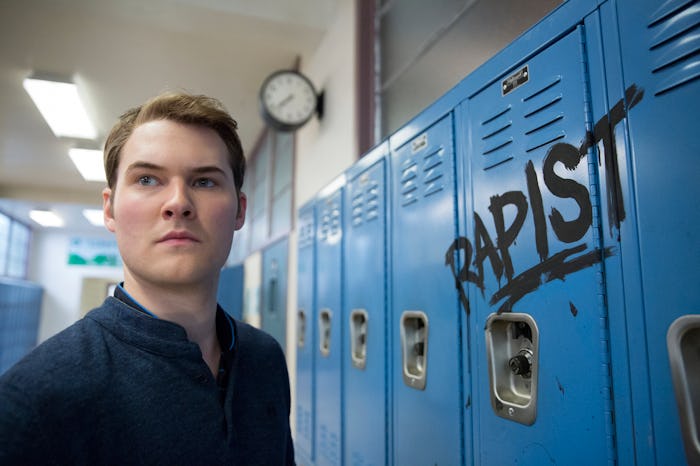Entertainment

Bryce's Sentence On '13 Reasons Why' Further Examines The Dangers Of Rape Culture
Warning: spoilers ahead for Episode 13! Much of the second season of 13 Reasons Why focused on the students' efforts to get Bryce Walker's actions exposed so that legal action could be taken against him for the rapes of Hannah, Jessica, and Chloe. Bryce was finally arrested at the end of Episode 12, but unfortunately things didn't quite turn out like everyone had hoped. Bryce's sentence on 13 Reasons Why isn't surprising, but it does further examine the dangers of rape culture.
In addition to the tapes Hannah distributed before her suicide and the recorded confession Clay got from Bryce in Season 1, there were a series of Polaroids of past assaults as evidence. It didn't seem like any of it would make a dent thanks to the culture in place that protected Bryce: he was a wealthy white athlete at a school that prized all those things and his word seemed to outweigh anyone else's. But Jessica reported her assault to the police in the penultimate episode, with Justin's corroboration, and it seemed like something might actually be done. It was a relief to see Bryce in handcuffs after everything.
But when Episode 13 began it became clear that there would be no justice for Bryce's victims after all. The judge only sentenced Bryce to three months of probation for felony sexual assault.
Bryce clearly knew how to play the game on the stand. He wore the glasses that supposedly made him so "relatable" during Hannah's trial. He spoke calmly and confidently about the remorse he felt, blaming his actions on the hookup culture he had never thought to question before. He said he was trying to be a better man and a better influence at school, seeking to change the circumstances that resulted in what he did. He put on the same act that he had when giving testimony about what happened with Hannah. And it worked.
Despite the fact that Jessica gave a statement that described the terror of her assault and the ongoing pain of seeing her rapist at school, Bryce was given an incredibly light sentence. His lawyer played up the fact that both Bryce and Jessica's live were changed, though he only talked about the minor consequences Bryce dealt with: he was no longer allowed to participate in athletics and he lost his scholarships. The lawyer said there was regret on both sides and that both Bryce and Jessica should be able to rebuild.
The judge agreed. He called Jessica's rape a "tragedy all around" and said that he had to look at both sides of the situation. He wanted to make sure there was no further damage to either student. The law encouraged rehabilitation and probation for first time offenders, which led to the judge's decision. He gave Bryce a warning to stay on the straight and narrow, and that was it. But Justin, who was arrested for accessory to felony sexual assault and did not have the family support or money Bryce did, received six months of probation. Bryce planned to go to a new school and start playing football again. He would get to pick up right where he left off. Essentially, nothing changed for him.
It's a familiar story for anyone who followed the Brock Turner trial. Turner was a student athlete at Stanford University who was convicted of three counts of felony sexual assault. According to The Atlantic, he could have received a maximum of 14 years in prison, with prosecutors recommending six; instead, he received six months in jail and three years of probation. He served three months in jail. There was an outcry because of the leniency of his sentencing, especially because it exemplified how perpetrators of sexual assault often don't face the consequences that they should.
Reflecting that real situation in the fictional world of the show allowed 13 Reasons Why to continue to explore rape culture, especially in school settings and regarding athletes who have an outsized amount of power on campus. It was far from a satisfying conclusion to this arc, but it was a frustratingly realistic one.
If you or someone you know are experiencing suicidal thoughts, call 911, or call the National Suicide Prevention Hotline at 1-800-273-8255.